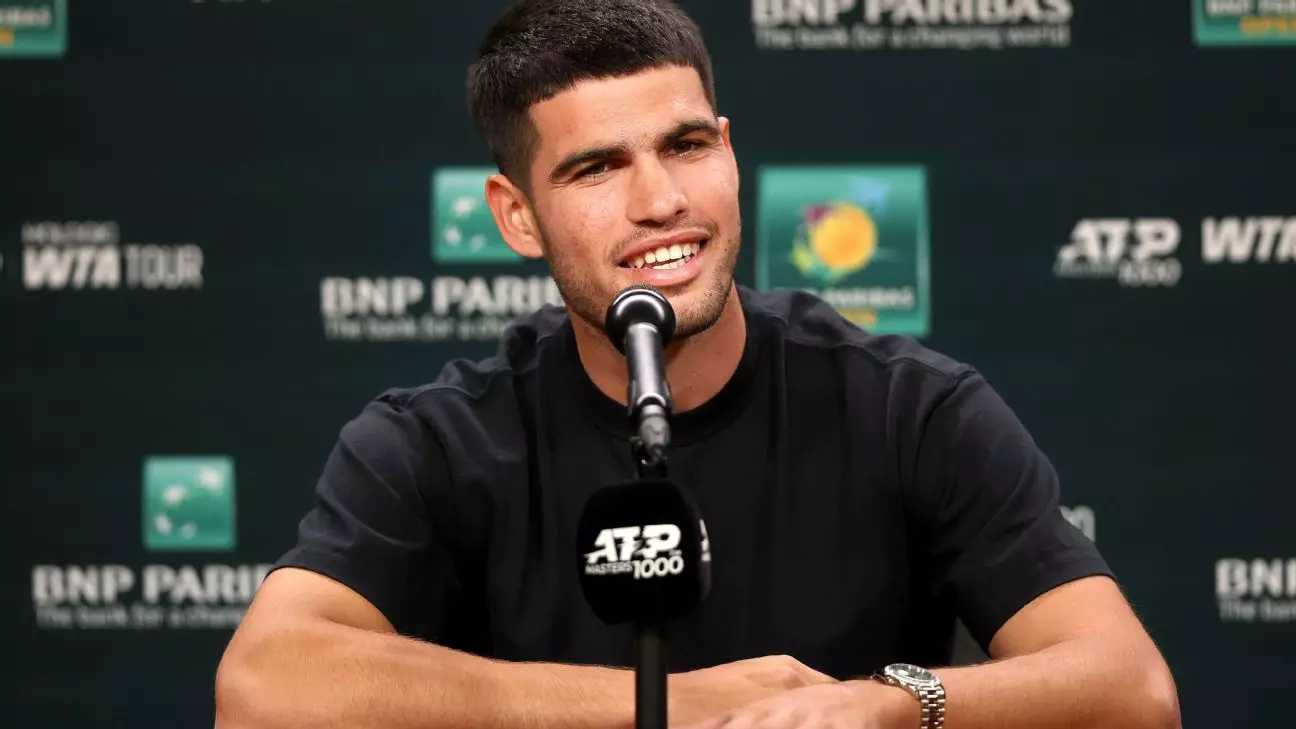In the high-stakes world of professional tennis, where the pressure to perform is palpable, young stars like Carlos Alcaraz must navigate complicated narratives that swirl around them. Recently, the 20-year-old Spaniard found himself unexpectedly at the center of a class-action lawsuit against key tennis organizations, claiming these bodies operate like a “cartel.” This revelation unfolded during a press conference for the Miami Open, where Alcaraz, currently seeded second, expressed his disconnect with this lawsuit spearheaded by the Professional Tennis Players’ Association (PTPA), co-founded by Novak Djokovic. While he acknowledges the pressing issues facing players today, he clearly voices his dissent regarding the method and message of this legal endeavor.
A Divided Tennis Community
Alcaraz’s remarks reflect a broader divide within professional tennis, one that underscores the varying approaches players take on issues of governance and athlete welfare. In his own words, he has “some things that I agree with” and “some things that I don’t.” This indicates an inherent complexity within the ranks of professional players. The PTPA claims backing from over 250 athletes, yet it is clear that not all tennis professionals are on the same page. Alcaraz’s candid dismissal serves as a snapshot of a fractured community where lucrative endorsements and historic rivalries might cloud cohesive action.
The lawsuit challenges the structures of the men’s (ATP) and women’s (WTA) tours, the International Tennis Federation (ITF), and the anti-doping body (ITIA) for allegedly creating an environment that is damaging to athletes’ well-being. Alcaraz, who is cited in the lawsuit, appeared both surprised and somewhat bemused by the mention of his name—it illustrates his position as an athlete caught in a battle that he neither sought nor fully endorses.
The Pressing Issue of Player Welfare
Among the concerns raised in the suit is the grueling schedule faced by players, with increasing mandatory tournaments leading to a punishing calendar. Alcaraz touched on this during a previous interview, warning that the relentless pace of the tennis season could “kill” players if not addressed. His concern is legitimate; a sport that demands peak physical and mental condition from its stars can no longer ignore the reality that continuous competition fosters burnout and injury. Players must prioritize longevity and sustainability over ambitious tournament schedules that prioritize profit over welfare.
In the midst of his concern, however, there is an undeniable sense of humor in Alcaraz’s reflection on the situation. His smile while discussing the lawsuit indicates a level of emotional intelligence; he recognizes that while the challenges are serious, the conversation surrounding them need not be devoid of levity.
Toward a Collaborative Future
What emerges from this moment is a call for dialogue within the tennis community. As Alcaraz positions himself among the sport’s elite, his perspective carries weight, urging both players and governing bodies to collaborate rather than litigate. The PTPA’s approach may resonate with a segment of the player population, but it is imperative that any changes reflect the collective will of athletes across varying experiences and stakes in the sport.
Alcaraz’s journey is inextricably tied to the future of tennis, a sport steeped in tradition yet yearning for evolution. The responsibility lies with both established players and rising stars to engage in constructive dialogue, ensuring that tennis remains a vibrant, equitable sport for generations to come.


Leave a Reply